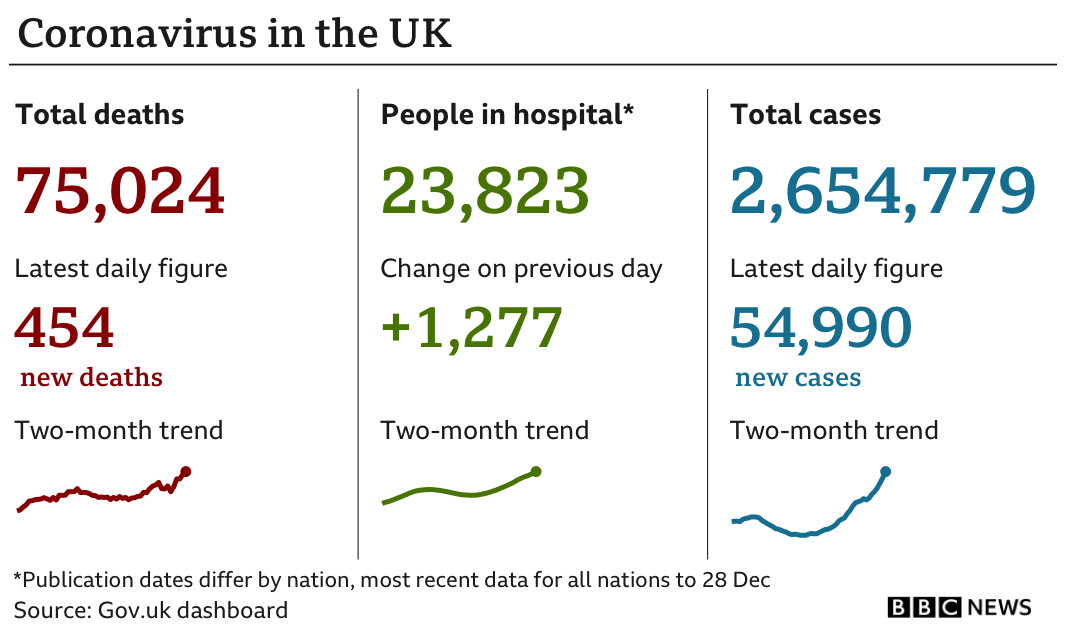Covid: Regional rules ‘probably going to get tougher’, says Boris Johnson
Regional restrictions in England are “probably about to get tougher” to curb rising Covid infections, the prime minister has warned.
Boris Johnson told the BBC stronger measures may be required in parts of the country in the coming weeks.
He said this included the possibility of keeping schools closed, although this is not “something we want to do”.
Labour leader Sir Keir Starmer has called for new England-wide restrictions within 24 hours.
Sir Keir said coronavirus was “clearly out of control” and it was “inevitable more schools are going to have to close”.
It comes as the UK recorded more than 50,000 new confirmed Covid cases for the sixth day in a row, with 54,990 announced on Sunday.
An additional 454 deaths within 28 days of a positive test result have also been reported, meaning the total by this measure is now above 75,000.
-
PM: Send children to school on Monday
- What could ‘tougher’ coronavirus measures mean?
- UK coronavirus cases up by 54,990 on Sunday
Speaking on BBC One’s Andrew Marr Show, Mr Johnson said he stuck by his previous prediction that the situation would be better by the spring, and he hoped “tens of millions” would be vaccinated in the next three months.
But he added: “It may be that we need to do things in the next few weeks that will be tougher in many parts of the country. I’m fully, fully reconciled to that.”
“And I bet the people of this country are reconciled to that because, until the vaccine really comes on stream in a massive way, we’re fighting this virus with the same set of tools.”

The PM added that ministers had taken “every reasonable step that we reasonably could” to prepare for winter, but “could not have reasonably predicted” the new, more transmissible variant of the virus that has emerged over the autumn.
Speaking after Mr Johnson’s interview, Sir Keir said introducing new nationwide restrictions in England “has to be the first step to controlling the virus”.
“There’s no good the prime minister hinting that further restrictions are coming into place in a week or two or three,” he told reporters on Sunday. “That delay has been the source of so many problems.”
“Let’s not have the prime minister saying ‘I’m going to do it, but not yet’,” he added.
Meanwhile, Mr Johnson defended plans for primary schools to reopen in most of England on Monday, amid opposition from teaching unions and some local councils.
It came after Amanda Spielman, the head of Ofsted, England’s schools watchdog, said closures should be kept to an “absolute minimum”.


The rapidly rising infection rates mean it should come as no surprise that tougher measures are being considered.
Infection levels are nearly four times higher now than they were at the start of December – and that in turn has put more pressure on hospitals.
There are signs the restrictions have started slowing the rises in London, the East of England and the South East.
But that on its own is not enough. Ministers want to get cases down.
So what extra can be done? After all most of England is effectively in lockdown already with tier four in place. Those places not in tier four could, of course, follow.
But some public health experts are warning more needs to be done.
There is a determination to get primary school children back – they have among the lowest rates of infection if you look at symptomatic cases.
But infection rates are higher among secondary school age children. The government has bought itself time by delaying their return.

A further 20 million people in England were added to tier four – “stay at home” – the toughest set of rules, on 31 December in a bid to stem a surge in Covid cases.
It means 78% of the population of England is now in tier four, under which non-essential shops are closed and people can only leave their homes for a certain number of reasons.
The Scottish government will meet on Monday to consider “further action” to limit the spread of the disease, Scottish First Minister Nicola Sturgeon said.
All of mainland Scotland is currently under its own level four restrictions – with only some islands under less stringent tier three measures.
Wales entered a nationwide lockdown on 20 December, with First Minister Mark Drakeford saying on Sunday it was “difficult to see” how the rules could be strengthened further.
He said Welsh ministers would consider whether restrictions could be “tweaked at the margins” at a cabinet meeting on Wednesday.
Northern Ireland is in the second week of a six-week lockdown that began on Boxing Day. Stricter measures, including a “stay-at-home curfew”, ended on Saturday.

- SCHOOLS: What will happen if children catch coronavirus?
- TESTING: How do I get a virus test?
- JOBS: How will I be kept safe at work?
- THE R NUMBER: What it means and why it matters

In another development, an academic has said there is a “big question mark” over whether a vaccine developed at Oxford University will be as effective against a new variant of the virus that has emerged in South Africa.
Prof Sir John Bell, Regius professor of medicine at the university, said the team there were currently investigating this question “right now”.
He added it was “unlikely” the variant would “turn off the effect of vaccines entirely,” and in any case it would be possible to tweak the vaccine in around 4-6 weeks.
“Everybody should stay calm – it’s going to be fine,” he told Times Radio.
“But we’re now in a game of cat and mouse – because these are not the only two variants we’re going to see.”

- BEST OF 2020: Barack Obama reads from his new and compelling presidential memoir
- BEST OF 2020: Grounded with Louis Theroux

Published at Sun, 03 Jan 2021 17:01:43 +0000





Comments
Loading…